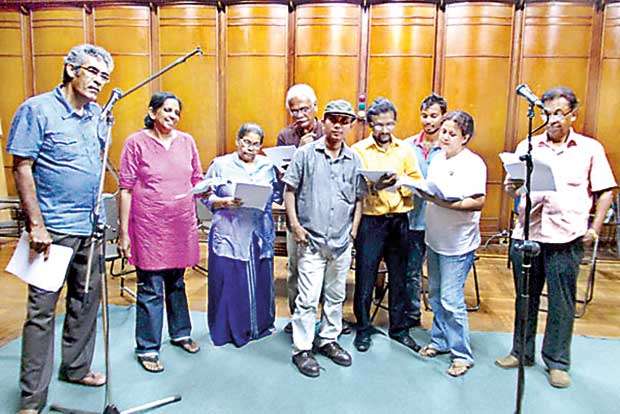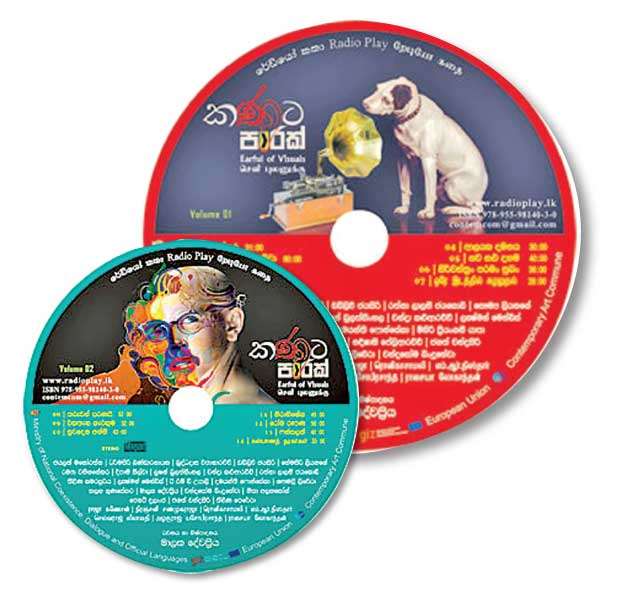Reply To:
Name - Reply Comment
Last Updated : 2024-04-25 17:00:00

Something there is that doesn’t love a wall,
That sends the frozen-ground-swell under it,
And spills the upper boulders in the sun;
And makes gaps even two can pass abreast.
- Robert Frost (‘Mending Wall’)
 ‘Kanepahara’ (lit. ‘A’ Box on the ears’) is the title of a series of radio dramas scheduled to be broadcast over the government owned Sri Lanka Broadcasting Corporation (SLBC) for the promotion of so-called post-war reconciliation among communities. The serial dramas have been produced under the auspices of the Office for National Unity and Reconciliation (ONUR), itself a government body headed by Chandrika Kumaratunga, a former president, who played a main role in toppling her bête noire Mahinda Rajapaksa’s government in 2015. The broadcast of the drama series is reported to be currently in suspension due to the intervention of the minister responsible (Wijedasa Rajapakshe) amidst an eruption of vocal protests by several Buddhist monks and lay Buddhists against the titles of some of the episodes lined up for broadcast for being allegedly disrespectful of Buddhism. What this writer feels, after following news about the matter via online sources, is that the ONUR probably wants to educate, through these plays, the rural listeners of the country who, they arbitrarily believe, are backward Buddhists, to think in unconventional ways so that they become more amenable to the Yahapalanaya’s alleged reconciliation process; however, its drama project is more likely to be an oblique scurrilous attack on the Sinhalese Buddhist majority who insist on safeguarding the age old Buddhist cultural foundation on which the Sri Lankan state still stands. It is this cultural foundation reinforced by many centuries of peaceful coexistence with the largest minority the predominantly Hindu Tamils, and the good neighbourly mainstream Muslims and Christians that always ensures communal harmony. There has been a groundswell of fresh awareness of the importance of replenishing customary inter-communal relations since the conclusion of separatist disturbances in 2009 for establishing a happy, secure, stable society. It is yet to be seen whether ‘Kanepahara’ is compatible with this trend or not.
‘Kanepahara’ (lit. ‘A’ Box on the ears’) is the title of a series of radio dramas scheduled to be broadcast over the government owned Sri Lanka Broadcasting Corporation (SLBC) for the promotion of so-called post-war reconciliation among communities. The serial dramas have been produced under the auspices of the Office for National Unity and Reconciliation (ONUR), itself a government body headed by Chandrika Kumaratunga, a former president, who played a main role in toppling her bête noire Mahinda Rajapaksa’s government in 2015. The broadcast of the drama series is reported to be currently in suspension due to the intervention of the minister responsible (Wijedasa Rajapakshe) amidst an eruption of vocal protests by several Buddhist monks and lay Buddhists against the titles of some of the episodes lined up for broadcast for being allegedly disrespectful of Buddhism. What this writer feels, after following news about the matter via online sources, is that the ONUR probably wants to educate, through these plays, the rural listeners of the country who, they arbitrarily believe, are backward Buddhists, to think in unconventional ways so that they become more amenable to the Yahapalanaya’s alleged reconciliation process; however, its drama project is more likely to be an oblique scurrilous attack on the Sinhalese Buddhist majority who insist on safeguarding the age old Buddhist cultural foundation on which the Sri Lankan state still stands. It is this cultural foundation reinforced by many centuries of peaceful coexistence with the largest minority the predominantly Hindu Tamils, and the good neighbourly mainstream Muslims and Christians that always ensures communal harmony. There has been a groundswell of fresh awareness of the importance of replenishing customary inter-communal relations since the conclusion of separatist disturbances in 2009 for establishing a happy, secure, stable society. It is yet to be seen whether ‘Kanepahara’ is compatible with this trend or not.
The monks and lay Buddhists who so vehemently criticize the lewd language of the titles do not prejudge the plays as lacking in artistic merit simply on that account. Neither does the present writer. These comments, like theirs, focus the sponsor of the plays, the ONUR and its probable motives. No criticism of the plays as works of art is intended. When this writer first read about the controversy and watched a video of the monks’ protest speeches (August 22, 2018), he was sceptical about the rationality of those protests. One reason for this was the fact that a group of very respectable, in fact, the most highly celebrated artistes available in the field in his opinion (such as Iranganie Serasinghe, Jayalath Manorathne, Wijerathne Warakagoda, Lakshman Wijesekera, Buddhadasa Vithanachchi, and Mahendra Perera, et al) had participated in the making of the radio plays: they had done the voice over. They wouldn’t have kept quiet if there was anything outrageously improper in the conversations they were required to utter. Of course, as professionals, they might have just followed directions.
The broadcast of the drama series is reported to be currently in suspension due to the intervention of the minister responsible
In any case, drama is literature. In literature, even moral messages may be couched in phraseology normally considered immoral for creating a particular effect, without subverting their original meaning, while interpreting them in a truthful unconventional way. This writer remembers how some very prominent Buddhist prelates during the premiership of Sirimavo Bandaranaike (1970-77) bitterly attacked a novel written by that doyen of Sinhala literature and culture Martin Wickremasinghe by the name of “Bhavatharanaya” or “Crossing (the Ocean of) Existence”, where he was accused of insulting the Buddha by misrepresenting his character. The monks agitated for the banning of the book, if my memory is correct. The wise Ms. Bandaranaike, a true Buddhist leader and ruler, patiently listened to their protests, and did what had to be done: she got a competent official to read the novel and advise her whether the book deserved to be banned. The person did accordingly, and told her that there was nothing in the book that justified a ban. That was the end of the problem, as far as this writer can remember. He also remembers that when Stanley Tambiah published his “Buddhism Betrayed” in 1992 (pl. see below), there was an even more strident outcry against it calling for a ban on it in Sri Lanka. The present writer, hearing about this from abroad, genuinely regretted that meaningless demand, for he felt that the publication of the book created a good opportunity for a patriotic Sri Lankan scholar, if possible, to authoritatively counter its suspected anti-Sinhalese Buddhist propagandist ideas.
“Kanepahara” too, perhaps, contains its own rebuttal, if it is that bad. After all, even if it turns out to be an attack on the traditional practices of Buddhists, there is no problem. There is a chance that the criticisms are valid, and could point towards essential reform. However, since there are learned monks to point these out, radio listeners need not worry about that. What they should worry about or should be reminded to worry about is the real political motive behind the drama serial, and to be aware enough not to be misled by the plays if their messages are subversive and harmful to them as a nation.
To return to the subject at hand after this necessary digression, it is well known now that there is a quasi, religio-politically motivated movement (with global ramifications) whose ultimate goal is to destroy the Sinhalese Buddhist cultural base of the country, the associated history, and the indissoluble bond between the Sinhala people and their historic island homeland. This is becoming evident everyday to the discerning public. The nonchalant anti-Buddhist irreligiousness of the play titles, while raising a smokescreen that conceals more serious mobilizations going on against the Sri Lankan state, accidentally betrays ONUR’s probable empathy with that global campaign (which seems to be aimed at extirpating the Buddhist cultural roots of the majority community the Sinhalese, thereby draining the lifeblood out of the veins of their national identity, and at finally disintegrating the unitary state).

What transpired in media reports suggested how the government and the main opposition each sought to exonerate itself from its obligation to do something about what looked like a flagrant lack of respect or regard for Buddhist cultural sensitivities shown by the ONUR. The fact that the drama series has been collectively named “Kanepahara”is probably meant to be a slap in face of the Sinhalese Buddhist majority. However, such superficial perceptions that are easily provoked could deflect people’s attention from the real issues hinted at in the foregoing paragraph. The erudite monks and others who are getting involved in the ultimately vacuous ‘blasphemy’ allegation (the idea of blasphemy is alien to Buddhism, in any case) had better investigate whether “Kanepahara” could be seen as a cultural Trojan Horse bought at own expense, if it happens to be seen in a positive light.
It was Ven. Omalpe Sobhita Thera, one of the stalwarts behind the regime change of 2015, who was probably the first to censure the titles of some of the plays. He took umbrage at perceived attempts at disgracing Buddhism through these plays with titles such as “Taruwan Saranai” (May (Film) Stars Protect You), “Nihon Saepa laebewa”(May You gain the Happiness of Japan), and “Nirwastram Paramam Sukhang”(Nudity is the Highest Happiness). These titles are irreverent parodies of some formulaic Buddhist expressions in common use, which correspond respectively, to “Teruwan Saranai”(May the Triple Gem Protect You), “Nivan Saepa Laebewa” (May You Attain Nibbana) and “Nibbanam Paramam Sukhang” (Nibbana is the supreme bliss). Absurd imitations of what are considered to be inviolable by Buddhists are deeply offensive to Buddhist sentiments. (The arbitrary English translations of the Sinhala titles of the three plays are the present writer’s.)
Ven. Omalpe Sobhitha’s (erstwhile?) allies in the Jathika Hela Urumaya have adopted a less censorious line. A statement issued by the JHU suggests that they apparently have no problem with the content of the plays, which they seem to consider revolutionary; yet they object to the titles as being offensive to Buddhist sentiments. They have offered the following three alternative names to the three given above: respectively, “Tharu Hamba Paeradunemi” (Lured to Ruin by Film Stars), “Sakura Ratin Paniwidayak”(Letter from Japan), and “Helu Saepa soya” (All for Lust), which have here been freely rendered into English as given in parentheses. Their statement ends with the aphoristic line: “Learn to be revolutionary. Be revolutionary to learn!” The JVP has also come out in favour of the ONUR’s “Kanepahara” drama series.
In the opinion of the present writer, it is the political context in which this dramatic confrontation between two organs of the government (the ONUR and the ministry involved) is being played out that should engage the attention of the people. As a member of the older generation of Sri Lankans, who is fairly au fait with the tumultuous history of post independence politics in the island nation at least since 1970, the present writer is perceptive enough to realize that a storm is currently brewing in its political firmament with a pall of darkness hanging over the country. In this highly volatile situation, an emotionally charged pre-broadcast controversy was triggered by the alleged profanity of the titles of some of the plays. The nearly simultaneous publication of a novel with a title that is considered even more sacrilegious (“Budunge Rasthiyaduwa” which, in English, would be “Buddha’s Time Killing”/”Buddha, the Time Killer”) added fuel to the flames of downright denunciation of the authors and the anti-Buddhist forces suspected to be behind them.
In the absence of the scripts of the relevant plays for this writer to examine, their ostensible overall purpose may be guessed from the official remit of the ONUR: bringing allegedly estranged communities together and getting them to mend fences with one another. But the indications are that the plays are more likely to contribute to the opposite process of ‘mending walls’ between communities as is actually happening at present. What could be the connection between this purpose and the plays which have been given such outrageous titles that seem to ridicule the conspicuous Buddhist culture of the country? This writer’s hunch is that the ONUR project is predicated on the wrong assumption that the single great obstacle to the establishment of national unity and reconciliation is the unnecessary ‘supremacy’ (as they allege) accorded to the Buddhasasana, which according to them undermines the avowed secular democratic nature of the state. The same argument is adopted by foreign meddlers in our affairs and political and religious enemies of the unitary status and the Buddhist cultural foundation of the country. Actually, Buddhist principles are most compatible with the secular political ideals that countries of the West claim to adopt. (It is a different matter that most of our politicians {of course, they may be pretending}, monks, and ordinary voters do not know what actually ‘secularism’ as applied to governance means; they think that it means rejection of all religious values in governing! whereas ‘secularism’ denotes ‘the principle of separation of the state from religious institutions’, which is what the Christian (majority) USA, the Christian (majority) UK and other Western Christian (majority) nations are adopting, and what Buddhist (majority) Sri Lanka should be allowed to adopt in freedom.) A frequent unrelated but true criticism that is raised by friend and foe alike against followers of Buddhism is that there is a glaring discrepancy between practice and precept.
“Kanepahara” too, perhaps, contains its own rebuttal, if it is that bad. After all it turns out to be an attack on the traditional practices of Buddhists
But the same criticism can be confidently raised against the followers of any religion. What matters is the fact that this charge is selectively applied to Sinhalese Buddhists by anti-Sinhalese Buddhist extremists. Politically motivated Tamil academic Stanley Tambiah wrongly accused Sinhalese Buddhist monks of being behind the anti-Tamil violence that was in reality, as knowledgeable Sri Lankans came to justifiably suspect post-event, conspiratorially instigated by internal and external enemies of the Sri Lankan state on a number of occasions in the past.
His 1992 book ‘Buddhism Betrayed – Religion, Politics and Violence in Sri Lanka’ was about this false claim of his. He excoriated Anagarika Dharmapala, the international Buddhist missionary and anti-British Sinhalese nationalist social reformer, and arguably the only great Sri Lankan who made the most significant impact on the rest of the world in the past 140 years as a mere irresponsible trouble maker (The Anagarika did this as a missionary of Theravada Buddhism, the really authentic version of the Buddhist doctrine that is most acceptable to the West). Misled by such racially prejudiced ‘intellectuals’ or determined to exploit their decidedly anti-Sinhalese Buddhist inauthentic theories for their own purposes, those political and religious Sri Lanka bashers seem to be at present having the best time of their ‘crusade’.
This baseless assumption that the unitary character of the Sri Lankan state with its dominant Buddhist cultural identity is prejudicial to the minorities is flying in the face of reality. The reality is that traditional communal harmony has held among ordinary Sri Lankans despite nearly three decades of civil strife, which ended in 2009. The strongest contributory factor that made this possible was the generous, inclusive, non-violent, accommodating nature of the dominant religious (Buddhist and Hindu) culture of the nation. The final stages of the civil war brought all Sri Lankans closer together than ever before. The then government started addressing urgent concerns of the northern and eastern provinces even before the war was well over. The five-year period that followed saw Sri Lanka moving in the correct direction in every sphere: national security, economic development, post war normalization of communal relations, return of democracy to the previously war-torn north and east provinces, etc. However, as now clear in retrospect, the ‘change’ that was forced on the country at the beginning of 2015 has gravely undermined the forward march of the Sri Lankan nation. Launching an unwanted cultural crusade against the majority community at this stage, while the whole nation is under siege as it were, even though it might possess some positive features, can only be counterproductive.

Add comment
Comments will be edited (grammar, spelling and slang) and authorized at the discretion of Daily Mirror online. The website also has the right not to publish selected comments.
Reply To:
Name - Reply Comment
US authorities are currently reviewing the manifest of every cargo aboard MV
On March 26, a couple arriving from Thailand was arrested with 88 live animal
According to villagers from Naula-Moragolla out of 105 families 80 can afford
Is the situation in Sri Lanka so grim that locals harbour hope that they coul